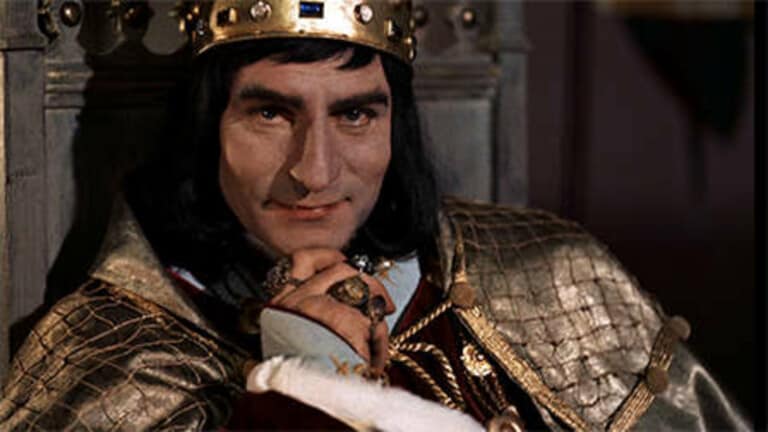I. The Vice
The Vice was the favourite character in medieval morality plays. He is both an intriguer and a deceiver. He creates laughter and engages the audience’s sympathy in a conspirational relationship.
Richard generates a special relation between word and deed. He tells the audience what he is going to do, then does it, and finally recalls what he did: his soliloquies and asides create a feeling of conspiracy.
The Vice is also a figure of carnival, who fights the established authority and embodies the audience’s anti-authoritarian impulses. He is an outlet for the people’s frustration.
II. A Monster
Shakespeare has added a physical deformity to the character of Richard because Richard was not a hunchback.
In fact, at that time, deformed people were said to be willing to take revenge against Nature: because they could not change their lot, they wanted to bring people down.
Another reason is that showing fairground attractions on stage was a trick often used by Shakespeare to incite people to see his plays. A character both deformed and mobile was a very scary monster.
III. The Machiavel
In the Elizabethan times, the Machiavel became a character but its initial status was absolute evil. In Christopher Marlowe’s Jew of Malta, there is a prologue entitled “The Prologue: Machiavel”.
Richard is also considered as a reincarnation of Machiavel. In Henry VI, Richard already says:
I have sent Machiavel to school
Richard III
Machiavel’s vice is characterized by ambition and power. Vice’s vice is lust. Machiavel is morally deprived, to the point of boasting his own depravity.
He is also more severe than Vice, very gifted with words and rhetorics, and efficient in convincing people. He is very good at reaching his aims: he divides and then conquers by opposing one side to the other.
For the Elizabethans, Machiavel was utter evil. In the Renaissance, he was considered as an individualist.
Individualism was strongly opposed to Augustine and Aquinas, for thought history was providential and ruled by God. For Machiavelli, on the contrary, everyone should play his own part in life.
In the play, the victory of the Machiavel is present from the beginning till the middle.
The second part shows history as still providential: Richmond the God-Sent becomes King. Richard is a hypocrite too: to become king, you must be religious, Richard appears between two bishops, “two props of virtue”.
The War of the Roses and York’s usurpation was still fresh in people’s minds. It had been a was still fresh in people’s minds.
It had been a period of disorder and chaos: people still remembered the civil and the divisions within the State: there was a need for exorcism. Shakespeare’s plays had a cathartic function.
According to Aristotle, the function of tragedy is catharsis: the audience will go through very powerful emotions but they will be protected by their status of audience. There is a play between participation (sympathy) and non-participation. The catharsis will allow an internal problem to be solved or externalized.
There is always a ritual quality in Shakespeare’s historical plays. In Richard III, it is pregnant in the lamentation scenes (like in Act IV, scene 4 with Margaret). These scenes are very rhetorical but in a conventional manner (by use of anaphors), as opposed to Richard’s puns and inventive style.
IV. The Scourge of God
The evil ruler is sent by God to punish sinful people, like Nero for the Romans. It is part of the retributive justice: we get what we deserve. In Richard III, it is very cruel for it introduces the notion of collective responsibility for England. The citizens (III, 2) and the crowd (III,7) are the representatives of the English people.
This guilt of England must be purged by a series of crimes, culminating in the scourge of Richard III. Richard is a sacrifice to redeem England from all her sins. He kills them all and then dies: a purgative and cleaning act for the whole nation. There are no innocents in Richard III, all are guilty.
- Clarence: for killing the Young Prince Lancaster.
- Edward: for killing the Young Lancaster too.
- Buckingham: for helping Richard.
- Anne: for letting Richard woo her.
- Elizabeth: for letting Richard woo her daughter.
War brought about treason and corruption. Margaret seems to be a victim but she killed Rutland: she is also a child murderer (this will later be used by Richard against her). She’s the only character that feels satisfied with the children’s death :
- she is as bitter as Richard.
- she wants the same evils inflicted on others as she has been inflicted, especially towards Elizabeth.
- logic of retaliation (an eye for an eye).
She is a prophetess but her main goal is guided by revenge. Shakespeare makes her leave the play as soon as she has her revenge. She leaves and Richmond appears, bringing some more positive notes.
Richmond is sent by God: he is the saviour figure who brings the Golden Age. On the contrary, Richard is the anti-Christ figure who inverts all Christian values. Richard is utterly evil. He is a figure of exorcism because he is so evil that he absorbs all the sins. His sins are not contagious: all the people who are influenced by him (Buckingham, Anne) will come to regret. Tyrell is sent to murder the children for money. He hires murderers and will regret it: “bloody act is done” (IV, 3).
Richard wants to personify evil on his own: he is a satanic figure and he is very proud of it: ” I am determined to be a villain” (I,1).
Richard is a parodist and a role-player :
- 1st role: with Clarence: the sympathizing brother
- 2nd role: with Anne: the passionate lover asking for charity
- 3rd role: with the two bishops: the devout
- 4th role: with the two princes: the devoted uncle
- 5th role: with Hastings (III, 5): the victim
There is a mise en abyme, a play within the play. “Hypocrite” in Greek means actor. Richard can pretend to be everything to get what he wants. He does not have the value of truth. He has a gift with rhetoric and is at his best when wooing Anne: he replaces her lamentations with Courtly Love through the use of stichomythia (in a dialogue, it refers to the re-use of something said by the other protagonist).
He manages to upset the linguistic foundations of her discourse. Language is an efficient tool but also a shaper of reality. In the end, we do not know where reality is for Richard also manages to woo the audience: it is disturbing.
The character of Richard makes the success of the play, because of :
- skills
- resources
- wit (“alacrity of spirit”)
- discernment
- courage (physical)
Richard thinks on his feet. He is not likable but the audience enjoys seeing him on stage. The spectator is therefore ambivalent.

